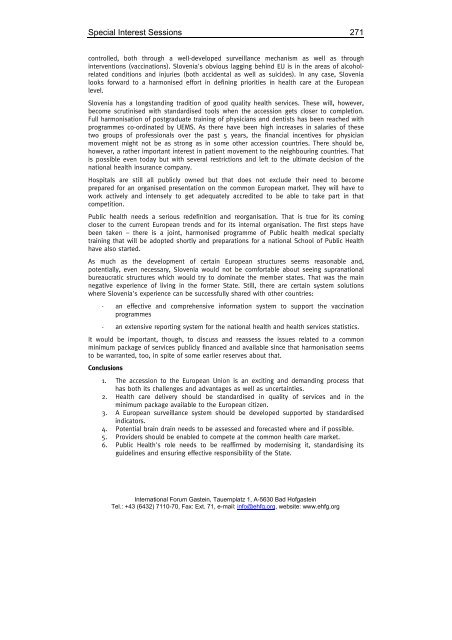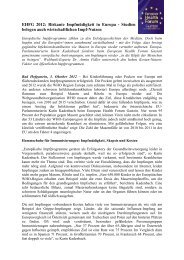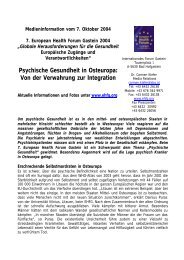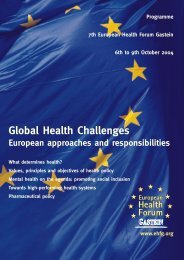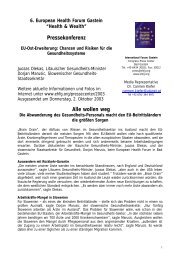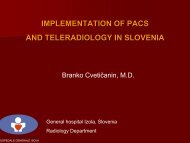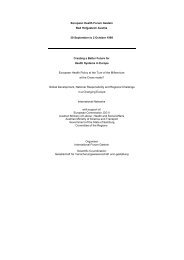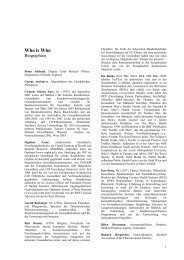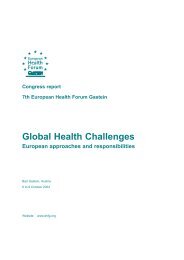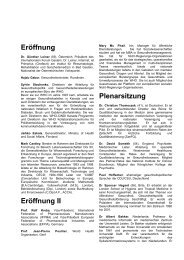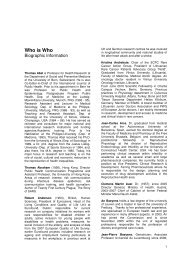Congress report - European Health Forum Gastein
Congress report - European Health Forum Gastein
Congress report - European Health Forum Gastein
Create successful ePaper yourself
Turn your PDF publications into a flip-book with our unique Google optimized e-Paper software.
Special Interest Sessions<br />
controlled, both through a well-developed surveillance mechanism as well as through<br />
interventions (vaccinations). Slovenia's obvious lagging behind EU is in the areas of alcoholrelated<br />
conditions and injuries (both accidental as well as suicides). In any case, Slovenia<br />
looks forward to a harmonised effort in defining priorities in health care at the <strong>European</strong><br />
level.<br />
Slovenia has a longstanding tradition of good quality health services. These will, however,<br />
become scrutinised with standardised tools when the accession gets closer to completion.<br />
Full harmonisation of postgraduate training of physicians and dentists has been reached with<br />
programmes co-ordinated by UEMS. As there have been high increases in salaries of these<br />
two groups of professionals over the past 5 years, the financial incentives for physician<br />
movement might not be as strong as in some other accession countries. There should be,<br />
however, a rather important interest in patient movement to the neighbouring countries. That<br />
is possible even today but with several restrictions and left to the ultimate decision of the<br />
national health insurance company.<br />
Hospitals are still all publicly owned but that does not exclude their need to become<br />
prepared for an organised presentation on the common <strong>European</strong> market. They will have to<br />
work actively and intensely to get adequately accredited to be able to take part in that<br />
competition.<br />
Public health needs a serious redefinition and reorganisation. That is true for its coming<br />
closer to the current <strong>European</strong> trends and for its internal organisation. The first steps have<br />
been taken – there is a joint, harmonised programme of Public health medical specialty<br />
training that will be adopted shortly and preparations for a national School of Public <strong>Health</strong><br />
have also started.<br />
As much as the development of certain <strong>European</strong> structures seems reasonable and,<br />
potentially, even necessary, Slovenia would not be comfortable about seeing supranational<br />
bureaucratic structures which would try to dominate the member states. That was the main<br />
negative experience of living in the former State. Still, there are certain system solutions<br />
where Slovenia's experience can be successfully shared with other countries:<br />
International <strong>Forum</strong> <strong>Gastein</strong>, Tauernplatz 1, A-5630 Bad Hofgastein<br />
Tel.: +43 (6432) 7110-70, Fax: Ext. 71, e-mail: info@ehfg.org, website: www.ehfg.org<br />
271<br />
- an effective and comprehensive information system to support the vaccination<br />
programmes<br />
- an extensive <strong>report</strong>ing system for the national health and health services statistics.<br />
It would be important, though, to discuss and reassess the issues related to a common<br />
minimum package of services publicly financed and available since that harmonisation seems<br />
to be warranted, too, in spite of some earlier reserves about that.<br />
Conclusions<br />
1. The accession to the <strong>European</strong> Union is an exciting and demanding process that<br />
has both its challenges and advantages as well as uncertainties.<br />
2. <strong>Health</strong> care delivery should be standardised in quality of services and in the<br />
minimum package available to the <strong>European</strong> citizen.<br />
3. A <strong>European</strong> surveillance system should be developed supported by standardised<br />
indicators.<br />
4. Potential brain drain needs to be assessed and forecasted where and if possible.<br />
5. Providers should be enabled to compete at the common health care market.<br />
6. Public <strong>Health</strong>'s role needs to be reaffirmed by modernising it, standardising its<br />
guidelines and ensuring effective responsibility of the State.


